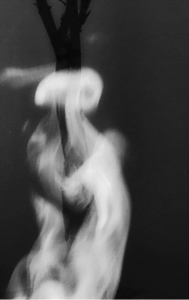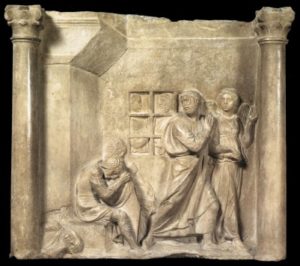We ponder Pentecost, the coming of Spirit, in a time of global pandemic, of Eucharistic hunger and fasting. The days of waiting between Ascension and Pentecost recall “Holy Saturday.” That day of silence between the cry from the cross and the cry of Resurrection wonder. That day when God’s absence serves as sacrament of God’s incarnate presence.
Indeed, much of our life unfolds in that space of Holy Saturday or pre-Pentecost waiting. More often than not, our life of faith, too, entails what Simone Weil calls “waiting for God,” even as our prayer finds expression as “a hushed cry of the creature, like a wordless cry for light before the hidden face of God” (J. B. Metz). How we need these times of waiting! How we need to nurture the capacity to hear and discern the hushed cry!
In our waiting for God we encounter the deepest implications of our invitation into faith. As disciples of Jesus, who encounter Jesus alive, raised up by God’s grace, we too find ourselves raised up to live the resurrection now. Pentecost impels us: live now as resurrected beings.
What might it mean to say: “we are called to live now as resurrected beings?”
St. Luke, who gives us the marvelous Pentecost narrative in the Acts of the Apostles, spells out the grace of that event in the subsequent journeys and terrifying stories of the earliest followers of Jesus. In receiving the Pentecost gift of Spirit, they are grasped and called by Resurrection faith to take the mission of Jesus in the service of God’s Reign to the ends of the earth.

“Tea Cup” © Julia D. E. Prinz.
There is a post-Pentecost story from Acts 12:1-10, the story of Peter’s imprisonment by Herod and his release through divine (angelic) action. This story takes the form of a resurrection narrative (although it focuses not on the murder of Jesus but the imprisonment of Peter.) Parallel to Jesus’s release from tomb (death), Peter finds himself released from prison cell (the “living death” of hopelessness). Both occur as a result of the direct action of God. Both usher in renewed energy for the service of God’s Reign.
Luke begins the story with a close description of a dire situation. “About that time, King Herod laid hands upon some members of the church to harm them. He had James, the brother of John, killed by the sword, and when he saw that this was pleasing to the Jews, he proceeded to arrest Peter also” (v.1-3). Luke describes the hopelessness of Peter’s confinement: “secured by double chains… sleeping between two soldiers, while outside the door guards kept watch on the prison” (v.6). He depicts the anxious community gathered in fervent prayer (v.5). Then follows the angelic jailbreak: “Suddenly the angel of the Lord stood by him… tapped Peter on the side and awakened him… The chains fell from his wrists” (v.7). The angel leads Peter, who thinks he is dreaming, out past the guards to “the iron gate… which opened for them by itself” (v.9-10a) After they “made their way down an alley… the angel left him” (v.10b).
A remarkable verbal painting of this story in the form of a poem comes from the brush of a great American poet, Denise Levertov. She does not repeat the story; she interprets it in the fashion of an Ignatian contemplation on the scene.
St. Peter and the Angel
Delivered out of raw continual pain,
smell of darkness, groans of those others
to whom he was chained –unchained, and led
past the sleepers,
door after door silently opening –
out!And along a long street’s
majestic emptiness under the moon:one hand on the angel’s shoulder, one
feeling the air before him,
eyes open but fixed…And not till he saw the angel had left him,
alone and free to resume
the ecstatic, dangerous, wearisome roads of
what he had still to do,
not till then did he recognize
this was no dream. More frightening
than arrest, than being chained to his warders:he could hear his own footsteps suddenly.
Had the angel’s feet
made any sound? He could not recall.
No one had missed him, no one was in pursuit.
He himself must be
the key, now, to the next door,
the next terrors of freedom and joy.
Note the sense of urgency contrasted with that fresh smell of an empty street at midnight. Note, too, the implicit realization that Peter’s release doesn’t result in some “happily ever after.” Just the opposite: He must resume/ the ecstatic, dangerous, wearisome roads of/ what he had still to do. The Pentecost narratives unambiguously entail vocation and a mission.
The Gospels do not fixate on miracle: they know that God is God. Rather, they focus on the urgency of the work to be done. Bring the Good News revealed in and by Jesus to the ends of the earth! But first take notice: This was no dream. We did not “invent” resurrection or the action of the Spirit. God’s grace is real and our call to live in that grace changes us forever.
The Gospels dwell not on miracle but on mystery, the mystery of freedom released from prison by the action of grace. Our graced freedom, not our fears (never our fears!) must guide our discernment of the way ahead. The Spirit of Resurrection and Pentecost now indwells us. Peter knew what this meant. He himself must be/ the key, now, to the next door,/ the next terrors of freedom and joy.
Let us not push too quickly against the prison cells of quarantine nor fixate on what the world will look like after the pandemic. Rather, let us trust the resurrection faith that even now fills us. As we wait for Pentecost let us trust that we ourselves have been formed by grace to be the key, now, to the next door,/ the next terrors of freedom and joy.

St. Peter and the Angel in Acts. 12:1-12 by the 15th century Florentine sculptor Luca della Robbia.
Rev. Kevin F. Burke, S.J., currently holds an appointment as Professor of Theology and Vice-President for University Mission at Regis University in Denver, CO. He previously served as professor of Fundamental and Systematic Theology at Weston Jesuit School of Theology, Cambridge, MA (1997-2006) and the Jesuit School of Theology in Berkeley, CA (2006-17), where he also served as Dean and Acting President (2006-12). Author or editor of seven books, including The Ground beneath the Cross: The Theology of Ignacio Ellacuría (Georgetown, 2000), Pedro Arrupe: Essential Writings (Orbis, 2004), and The Ignatian Tradition (Liturgical Press, 2006), he is currently writing a book on the theological vision of the poet, Denise Levertov.
IVC By the Numbers
-
25 – Years of service to the poor and marginalized
-
26 – Cities served by IVC across the United States
-
$11,372,296 – IVC’s annual economic contribution to communities across the country.

